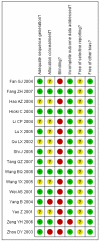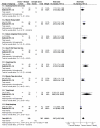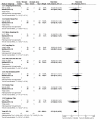Chinese herbal medicines for people with impaired glucose tolerance or impaired fasting blood glucose - PubMed (original) (raw)
Review
Chinese herbal medicines for people with impaired glucose tolerance or impaired fasting blood glucose
Suzanne J Grant et al. Cochrane Database Syst Rev. 2009.
Abstract
Background: Around 308 million people worldwide are estimated to have impaired glucose tolerance (IGT); 25% to 75% of these will develop diabetes within a decade of initial diagnosis. At diagnosis, half will have tissue-related damage and all have an increased risk for coronary heart disease.
Objectives: The objective of this review was to assess the effects and safety of Chinese herbal medicines for the treatment of people with impaired glucose tolerance or impaired fasting glucose (IFG).
Search strategy: We searched the following databases: The Cochrane Library, PubMed, EMBASE, AMED, a range of Chinese language databases, SIGLE and databases of ongoing trials.
Selection criteria: Randomised clinical trials comparing Chinese herbal medicines with placebo, no treatment, pharmacological or non-pharmacological interventions in people with IGT or IFG were considered.
Data collection and analysis: Two authors independently extracted data. Trials were assessed for risk of bias against key criteria: random sequence generation, allocation concealment, blinding of participants, outcome assessors and intervention providers, incomplete outcome data, selective outcome reporting and other sources of bias.
Main results: This review examined 16 trials lasting four weeks to two years involving 1391 participants receiving 15 different Chinese herbal medicines in eight different comparisons. No trial reported on mortality, morbidity or costs. No serious adverse events like severe hypoglycaemia were observed. Meta-analysis of eight trials showed that those receiving Chinese herbal medicines combined with lifestyle modification were more than twice as likely to have their fasting plasma glucose levels return to normal levels (i.e. fasting plasma glucose <7.8 mmol/L and 2hr blood glucose <11.1 mmol/L) compared to lifestyle modification alone (RR 2.07; 95% confidence intervall (CI) 1.52 to 2.82). Those receiving Chinese herbs were less likely to progress to diabetes over the duration of the trial (RR 0.33; 95% CI 0.19 to 0.58). However, all trials had a considerable risk of bias and none of the specific herbal medicines comparison data was available from more than one study. Moreover, results could have been confounded by rates of natural reversion to normal glucose levels.
Authors' conclusions: The positive evidence in favour of Chinese herbal medicines for the treatment of IGT or IFG is constrained by the following factors: lack of trials that tested the same herbal medicine, lack of details on co-interventions, unclear methods of randomisation, poor reporting and other risks of bias.
Figures
Figure 1
PRISMA (Preferred Reporting Items for Systematic Reviews and Meta-Analyses) flow-chart of study selection
Figure 2
Risk of bias summary: review authors’ judgements about each risk of bias item for each included study.
Figure 3
Forest plot of outcome ‘normalisation of fasting blood glucose at trial completion’ (herbal medicines plus lifestyle modification versus lifestyle modification alone)
Figure 4
Forest plot of outcome ‘diabetes incidence’ (herbal medicines plus lifestyle modification versus lifestyle modification alone)
Figure 5
Funnel plot of outcome ‘normalisation of fasting blood glucose at trial completion’ (herbal medicines plus lifestyle modification versus lifestyle modification alone)
Figure 6
Funnel plot of outcome ‘diabetes incidence’ (herbal medicines plus lifestyle modification versus lifestyle modification alone)
Similar articles
- Folic acid supplementation and malaria susceptibility and severity among people taking antifolate antimalarial drugs in endemic areas.
Crider K, Williams J, Qi YP, Gutman J, Yeung L, Mai C, Finkelstain J, Mehta S, Pons-Duran C, Menéndez C, Moraleda C, Rogers L, Daniels K, Green P. Crider K, et al. Cochrane Database Syst Rev. 2022 Feb 1;2(2022):CD014217. doi: 10.1002/14651858.CD014217. Cochrane Database Syst Rev. 2022. PMID: 36321557 Free PMC article. - Herbal medicines for viral myocarditis.
Liu ZL, Liu ZJ, Liu JP, Kwong JS. Liu ZL, et al. Cochrane Database Syst Rev. 2013 Aug 28;(8):CD003711. doi: 10.1002/14651858.CD003711.pub5. Cochrane Database Syst Rev. 2013. PMID: 23986406 Updated. Review. - Herbal medicines for fatty liver diseases.
Liu ZL, Xie LZ, Zhu J, Li GQ, Grant SJ, Liu JP. Liu ZL, et al. Cochrane Database Syst Rev. 2013 Aug 24;(8):CD009059. doi: 10.1002/14651858.CD009059.pub2. Cochrane Database Syst Rev. 2013. PMID: 23975682 Review. - Herbal medicines for viral myocarditis.
Liu ZL, Liu ZJ, Liu JP, Kwong JS. Liu ZL, et al. Cochrane Database Syst Rev. 2012 Nov 14;11:CD003711. doi: 10.1002/14651858.CD003711.pub4. Cochrane Database Syst Rev. 2012. PMID: 23152220 Updated. Review.
Cited by
- Dilemmas in Elderly Diabetes and Clinical Practice Involving Traditional Chinese Medicine.
Xue C, Chen Y, Bi Y, Yang X, Chen K, Tang C, Tong X, Zhao L, Wang H. Xue C, et al. Pharmaceuticals (Basel). 2024 Jul 16;17(7):953. doi: 10.3390/ph17070953. Pharmaceuticals (Basel). 2024. PMID: 39065801 Free PMC article. Review. - Hepatitis A virus infection.
Van Damme P, Pintó RM, Feng Z, Cui F, Gentile A, Shouval D. Van Damme P, et al. Nat Rev Dis Primers. 2023 Sep 28;9(1):51. doi: 10.1038/s41572-023-00461-2. Nat Rev Dis Primers. 2023. PMID: 37770459 Review. - Common Ayurvedic, Chinese traditional and Unani antidiabetic formulations- a review.
Murudkar PH, Tambe MS, Chandrasekar SB, Boddeda B, Pawar AT. Murudkar PH, et al. Front Pharmacol. 2022 Oct 12;13:991083. doi: 10.3389/fphar.2022.991083. eCollection 2022. Front Pharmacol. 2022. PMID: 36313351 Free PMC article. Review. - The additive effects of exercise and essential amino acid on muscle mass and strength in community-dwelling older Japanese women with muscle mass decline, but not weakness and slowness: a randomized controlled and placebo trial.
Kim H, Kojima N, Uchida R, Somekawa S, Inoue N, Kobayashi H, Osuka Y. Kim H, et al. Aging Clin Exp Res. 2021 Jul;33(7):1841-1852. doi: 10.1007/s40520-020-01713-x. Epub 2020 Sep 25. Aging Clin Exp Res. 2021. PMID: 32978751 Clinical Trial. - Dietary supplements for prediabetes: A protocol for a systematic review and meta-analysis.
Liu D, Wen Q, Liu M, Gao Y, Luo L, Zhang Z, Chen Q. Liu D, et al. Medicine (Baltimore). 2020 May;99(20):e20347. doi: 10.1097/MD.0000000000020347. Medicine (Baltimore). 2020. PMID: 32443387 Free PMC article.
References
References to studies
- Published and unpublished data Fan GJ, Luo GB, Qin ML, Li SL, Tang AH, Tang JY. Effect of jiangtang bushen recipe in intervention treatment of patients with impaired glucose tolerance [Jiang tang bushen fang dui tang nai liang di jian huan zhe gan yu zhi liao de ying xiang] Chinese Journal of Intergrated Traditional and Western Medicine [Zhong Guo Zhong Xi Yi Jie He Za Zhi] 2004;24(4):317–20.
- Published and unpublished data Fang ZH. Observation of the effectiveness of Dan zhi jiang tang capsules for IGT [Dan Zhi Jiang Tang Nang Gan Yu Pu Tao Tang Nai Liang Di Jian Liao Xiao Guan Cha] Journal of Emergency Traditional Chinese Medicine [Zhong Guo Zhong Yi Ji Zheng] 2007;16:402–04.
- Hao AZ, Hu J, Liu ZF, Cui Y. Therapeutic effect of Xiaoke Huayu tablet on impaired glucose tolerance [Xiao ke hua yu pian gan yu zhi liao tang nai liang jian di de lin chuang guan cha] Medical Journal of Chinese People’s Liberation Army [Jie Fang Jun Yi Xue Za Zhi] 2004;29(11):993–94.
- Hioki C, Yoshimoto K, Yoshida T. Efficacy of Bofu-Tsusho-san, an oriental herbal medicine, in obese Japanese women with impaired glucose tolerance. Clinical and Experimental Pharmacology and Physiology. 2004;31:614–19. - PubMed
- Li CP, Xie B, Huang J, Li HB, Li QM. Clinical observation of the effect of Qimai jingtang yin on impaired glucose tolerance [Qi mai jiang tang yin dui tang nai liang di jian gan yu lin chuang liao xiao guan cha] Journal of Sichuan Traditional Chinese Medicine [Si Chuan Zhong Yi] 2004;22(10):32–3.
Other references
- American Diabetic Association Report of the Expert Committee on the Diagnosis and Classification of Diabetes Mellitus. Diabetes Care. 1997;20:1183–97. - PubMed
- American Diabetes Association The Expert Committee on the Diagnosis and Classification of Diabetes Mellitus. Report of The Expert Committee on the Diagnosis and Classification of Diabetes Mellitus. Diabetes Care. 1999;22(Suppl 1):S5–19. - PubMed
- American Diabetes Association The prevention or delay of type 2 diabetes. Diabetes Care. 2003;26(Suppl 1):S62–9. - PubMed
- American Diabetes Association American Diabetes Association Clinical Practice Recommendations. Diabetes Care. 2009;32(Suppl 1):S13–S61. - PubMed
- AHFS . American Hospital Formulary Service Drug Information. Vol. 1. American Society of Health-System Pharmacists, Inc.; Bethesda, USA: 1999. Metformin Hydrochloride; pp. 2755–63.
Publication types
MeSH terms
Substances
LinkOut - more resources
Full Text Sources
Medical





